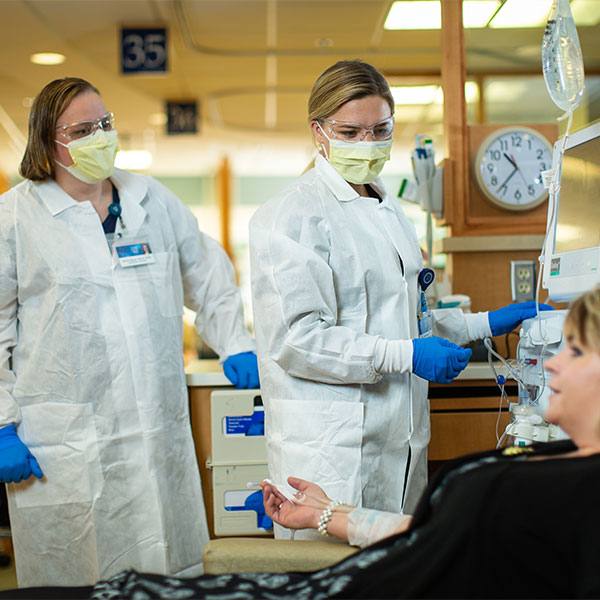-
Biotherapeutics
From advanced-practice provider to regenerative medicine innovator
It's not often that an advanced-practice provider is the teacher and a physician is the student. What some may consider a role reversal is one of many ways that Jennifer Arthurs, a nurse practitioner for Mayo Clinic's Regenerative Medicine Therapeutic Suites in Florida, is at the vanguard of a new wave in medical practice.
Regenerative medicine is an evolving field that seeks to repair, restore or replace diseased cells, tissues or organs. Arthurs has been at the forefront of this movement since Mayo Clinic's Regenerative Medicine Therapeutic Suites opened in 2016.
This first-of-its-kind clinic combines research and practice to deliver the latest regenerative procedures for various medical conditions. She leads the Patient Consult Service, with an emphasis on educating patients about the newest ways regenerative procedures can bolster standard care.
Mayo Clinic's Center for Regenerative Medicine has been a driver of the Regenerative Medicine Therapeutic Suites as part of its objective of bringing new cures for unmet patient needs.
"A lot of patients who come through the program may be misinformed about the emergent field of regenerative medicine. I provide them with an evidence-based discussion on the regenerative therapies that we offer as part of our clinical practice. We discuss what is well-studied and what we know about these procedures, and what is unknown or unpublished," says Arthurs.
Each patient's journey through the Patient Consult Service begins with a thorough examination of his or her condition. Before Arthurs or another provider prescribes medications or makes a referral to any type of regenerative therapy, a patient's medical diagnosis is reviewed and treatment options are discussed. Are there standard therapies that would be a first choice? If not, what is the best course of action?
"If the patient's comprehensive evaluation finds that no standard treatment will be effective, I follow up with an evidence-based discussion on the regenerative therapies that we offer as part of our clinical practice that is specific to their condition," says Arthurs. "If patients' medical needs are suitable, they will be given the option to receive research-based regenerative procedures. In addition, we may make referrals to subspecialties throughout Mayo Clinic or even to a clinical trial if they are qualified candidates."
Arthurs' background as an advanced-practice nurse in hematology and oncology prepared her to deliver the types of cellular therapies that are now available within the Regenerative Medicine Therapeutic Suites. An example is bone marrow aspirate concentrate, in which cells extracted from bone marrow tissue are combined with growth factors to buttress healing. Arthurs collaborated on the first published studies of safety and efficacy of bone marrow aspirate concentrate for osteoarthritis on the knee.
"When we treated our first patient with stem cells for knee arthritis in the bone marrow aspirate concentrate randomized controlled trial in 2013, Jennifer volunteered her time to assist with bone marrow harvests and taught me how to perform proper bone marrow aspirations as part of that research study," says Shane Shapiro, M.D., medical director of the Regenerative Medicine Therapeutic Suites. "Her insights were invaluable. We've since gone on to work together as a team offering these regenerative procedures as a way to bridge the gap for patients who don't respond to standard care but are not yet ready for surgery."
As an innovator in regenerative medicine, Arthurs and her team seek to go beyond regenerative procedures now common in orthopedics and dermatology to integrate regenerative medicine into clinical practice across a broad range of specialties, including plastic surgery, gynecology and ophthalmology.
"This engagement across medical specialties is advancing regenerative medicine research that results in new service lines that are tested in clinical trials. We are constantly interacting with patients who've undergone regenerative procedures, following outcomes and making sure we have a database of real-world evidence," says Arthurs.
Autologous serum eyedrops for patients with chronic dry eye is an example of a new service line that emerged from the collaboration between regenerative medicine and Mayo Clinic's Department of Ophthalmology. This is a procedure in which serum extracted from a patient's blood is used in eyedrops to restore eye moisture. Arthurs' team worked with Ophthalmology to streamline the process of manufacturing and delivering these eyedrops to patients who may receive them at the point of care within the Regenerative Medicine Therapeutic Suites.
In addition, Arthurs and her team recently obtained Food and Drug Administration (FDA) investigational new drug use approval to test platelet-rich plasma as a possible treatment for vulvar lichen sclerosis, a painful and itchy thinning of the skin. Platelet-rich plasma is a procedure in which platelets spun from a patient's blood are used to trigger healing. This procedure is available within the Regenerative Medicine Therapeutic Suites to ease conditions such as arthritis and hair loss.
The procedures available in the Regenerative Medicine Therapeutic Suites are based on validated scientific data. They are performed under strict quality control measures in alignment with FDA guidelines.
For more information on the Regenerative Medicine Therapeutic Suites, including a telehealth or on-site appointment, call the Florida Central Appointment Office at 904-953-0853.










